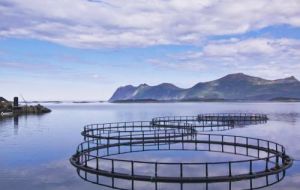MercoPress. South Atlantic News Agency
UN aquaculture initiative to help low-income countries fight hunger
 Aquaculture is the world’s fastest growing source of animal protein, growing by more than 60% between 2000 and 2008.
Aquaculture is the world’s fastest growing source of animal protein, growing by more than 60% between 2000 and 2008. A United Nations-backed initiative that will form partnerships among governments, development agencies and universities has been launched to better understand how aquaculture can help low-income countries fight hunger.
“The project will work closely with fish farming communities and will focus on field research in many major aquaculture countries in the developing world,” said Rohana Subasinghe, a senior expert of the Food and Agriculture Organization (FAO) on aquaculture and coordinator of the project.
“It will develop tools and methodologies to help key partners to develop policies geared to improving aquaculture’s contribution to food and nutrition security.”
Aquaculture, which involves cultivating fresh water and saltwater populations of fish under controlled conditions as opposed to catching fish in the wild, is the world’s fastest growing source of animal protein, growing by more than 60% between 2000 and 2008, from 32.4 million tons to 52.5 million tons. Nearly 50% of the fish for consumption comes from this practice.
Although aquaculture is widely regarded to play a pivotal role in fighting hunger, little is known about its exact impact on food and nutrition security and poverty alleviation in developing countries. However, given population growth projections, aquaculture will need to expand to meet future demand for fish, FAO said in a news release.
The initiative –Aquaculture for Food Security, Poverty Alleviation and Nutrition (AFSPAN) – will examine low-income food-deficit countries in Africa, Asia and Latin America to develop sustainable fishing policies and support the livelihoods of millions of small-scale fish farmers.
AFSPAN will also develop new ways to quantify the contribution of aquaculture with systematic and quantitative assessments, and elaborate strategies for improving the impact of aquaculture on food and nutrition security and poverty alleviation.
The three-year project will be funded by the European Union (EU) with one million Euros, which will be managed by FAO in partnership with a global alliance of 20 development agencies, governments and universities.




Top Comments
Disclaimer & comment rules-

-

-

Read all commentsThis could be a growth area for Britain and Argentina alike, as coastal nations both...
Oct 03rd, 2012 - 02:33 am 0esta aposta da ONU de convidar os paises em investir na agricultora é aposta do futuro no nosso mundo criar agricultora sustentavel ajuda a baixar a renda e combater a pobresa
Oct 03rd, 2012 - 10:18 am 0Salmon in the south
Oct 04th, 2012 - 07:38 pm 0Tilapia and prawn in the north
Certainly, in the north, the farmed fish come to the table tasting fresher than wild-caught fish.
Fish is - like livestock - much more energetically costly than arable crops, but really does taste good so, for one or two meals a week, it is good value for rich and poor alike.
Commenting for this story is now closed.
If you have a Facebook account, become a fan and comment on our Facebook Page!